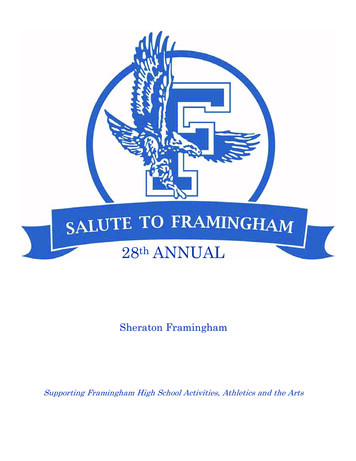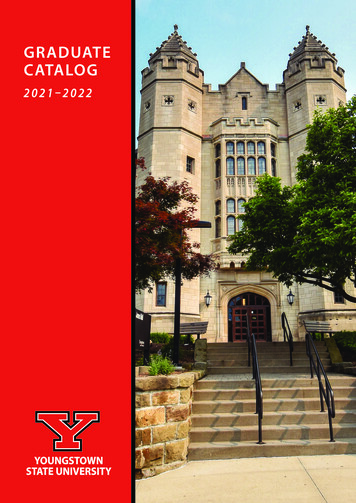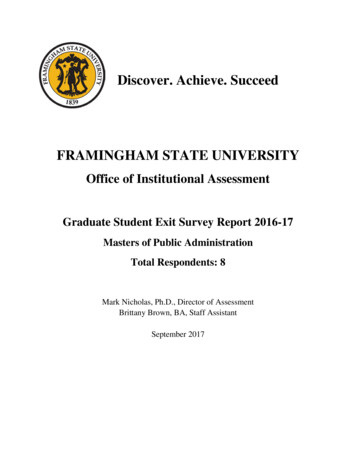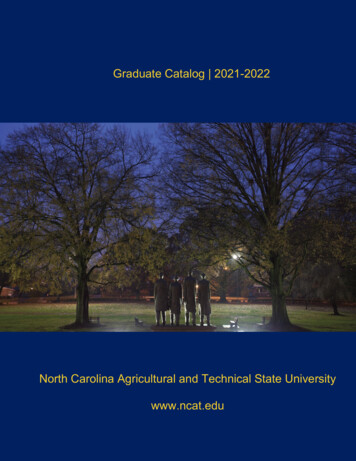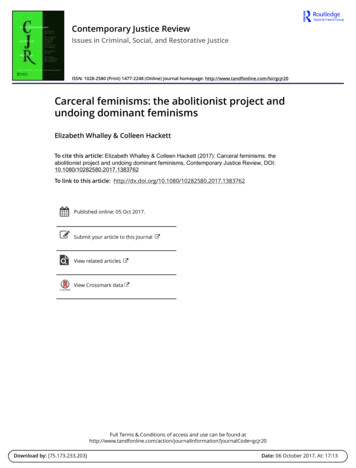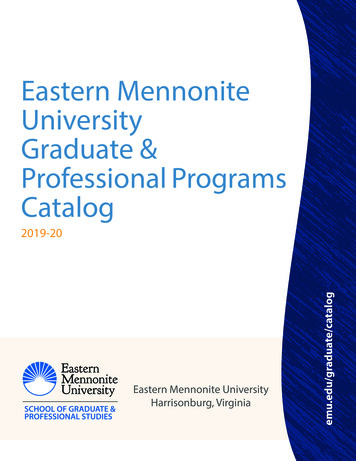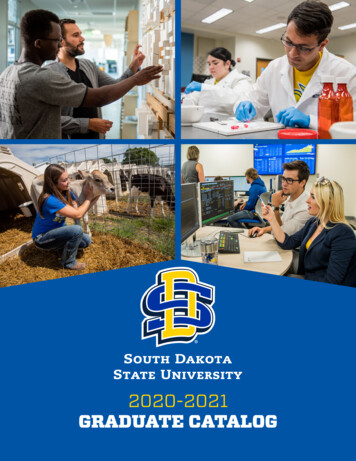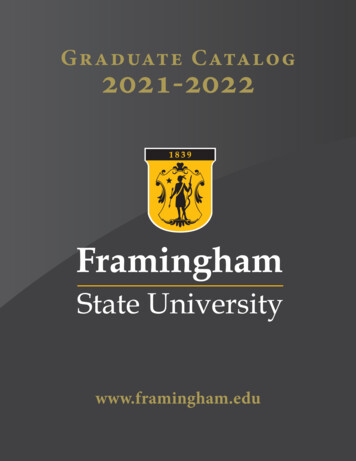
Transcription
Graduate Catalog2021-2022www.framingham.edu
AccreditationFramingham State University Graduate Catalog 2021-2022ACCREDITATIONFramingham State University is accredited by the New England Commission on Higher Education,(NECHE), the regional accreditation agency for colleges and universities in the six New Englandstates: Connecticut, Maine, Massachusetts, New Hampshire, Rhode Island, and Vermont. TheCommission consists of faculty and administrators from affiliated institutions and public members.The Commission is recognized by the U.S. Secretary of Education as a reliable authority on thequality of education for the institutions it accredits. The Commission is also recognized by theCouncil for Higher Education Accreditation (CHEA), affirming that the NECHE Standards andprocesses are consistent with the quality, improvement, and accountability expectations that CHEAhas established.Accreditation is a status that provides assurance to prospective students, their families and thegeneral public that an institution meets clearly stated Standards for Accreditation and that there arereasonable grounds to believe the institution will continue to meet those standards in the future.More information about accreditation is available on this website and from the Council for HigherEducation Accreditation (CHEA), www.chea.org, and the United States Department of dex.html?src qc.Accreditation by NECHE is not partial but applies to the institution as a whole. As such, it is not aguarantee of the quality of every course or program offered, or the competence of individualgraduates. Rather, it provides reasonable assurance about the quality of opportunities available tostudents who attend the institution. Inquiries regarding the status of an institution’s accreditation byNECHE should be directed to the administrative staff of the school or college.PROGRAM ACCREDITATION BY:The baccalaureate degree program in nursing at Framingham State University is accredited by theCommission on Collegiate Nursing Education (http://www.ccneaccreditation.org)Accreditation Council for Education in Nutrition and Dietetics (ACEND) of the Academy ofNutrition and Dietetics (AND), 120 South Riverside Plaza, Suite 2109, Chicago, IL 60606-6995,312-899-0040, extension 5400; for the Food and Nutrition Major, with concentrations inNutrition Dietetics and Coordinated Program in Dietetics. www.eatright.org/ACENDInternational Assembly for Collegiate Business Education (IACBE)National Association of Schools of Art and Design (NASAD)National Council for Accreditation of Teacher Education; (NCATE)APPROVED BY:American Chemical Society (ACS).Initial and Professional Licensure Programs for educators are approved by the Department ofElementary and Secondary Education (DESE) of the Commonwealth of Massachusetts, and theNational Association of State Directors of Teacher Education and Certification (NASDTEC).Interstate Certification Compact on Certification of Educational Personnel.MEMBER OF:American Association of Colleges of Nursing (AACN)American Association of Colleges for Teacher Education (AACTE)American Association of State Colleges and Universities (AASCU)College Entrance Examination BoardCouncil for the Advancement and Support of Education (CASE)National League for Nursing (NLN)New England Association of Schools and Colleges (NEASC)The College BoardNOTICE TO STUDENTSThe rules, regulations, policies, fees, and other charges, courses of study, and academic requirementsthat appear in this catalog were in effect at the time of its publication. Like everything else in thiscatalog, they are published for informational purposes only, and they do not constitute a contractbetween the University and any student, applicant for admission or other person. Whether notedelsewhere in this catalog or not, the University reserves the right to change, eliminate, and add to anyexisting (and to introduce additional) rules, regulations, policies, fees and other charges, courses ofstudy and academic requirements. Whenever it does so, the University will give as much advancenotice as it considers feasible or appropriate, but it reserves the right in all cases to do so withoutnotice.
Table of ContentsFramingham State University Graduate Catalog 2021-2022Table of ContentsMission Statement3History of Framingham State University5Graduate Admissions6Post-Baccalaureate Teacher Licensure Admissions8Graduate Academic Regulations and Policies11Financial Information28Campus Resources33Graduate Programs36Master of Arts (M.A.)Counseling Psychology, Licensure39Counseling Psychology, Non-licensure47English52Master of Business Administration (M.B.A.)Biotechnology Operations63Management69Master of Education (M.Ed.)Art75Early Childhood Education, Initial Licensure82Early Childhood Education, Professional Track86Educational Technology90Elementary Education, Initial Licensure94Elementary Education, Professional Track98Literacy & Language101Mathematics105Nutrition EducationNutrition Education Specialist109School Nutrition Specialist115Science, Technology, Engineering, & Mathematics (STEM)120Secondary Education124Special Education – Moderate Disabilities133Teaching of English as a Second Language140Master of Healthcare Administration (M.H.A.)Healthcare Administration145Master of Human Resources (M.H.R.)Human Resource Management149Master of Public Administration (M.P.A.)Public Administration153Master of Science (M.S.)Food and Nutrition:Coordinated Program in Dietetics157Food Science and Nutrition Science165Nutrition Science and Informatics169Organizational Leadership Page 1 175
Table of ContentsFramingham State University Graduate Catalog 2021-2022Master of Science in Nursing (M.S.N.)Nursing Case Management179Nursing Education182Nursing Leadership185Professional Science Master’s (P.S.M.)Biotechnology:Quality Assurance188International ProgramsMaster of Arts (M.A.)Educational Leadership (Non-Licensure)193Master of Education (M.Ed.)International Teaching (Non-Licensure)197Special Education (Non-Licensure)201Teaching of English as a Second Language (Non-Licensure)204Content Electives207Graduate & Post-Graduate Certificate Programs211Educational Leadership212Fundamentals of Biotechnology214Healthcare Administration216Human Resource Management218Instructional Technology Proficiency220Merchandising222Nursing Case Management224Public Administration226School Nutrition Specialist228Science, Technology, Engineering, Mathematics (STEM) Education 230Simulation for Nurse Educators232Special Needs234The Teaching of English as a Second Language (TESL)236Quality Assurance for Biotechnology238Nursing Education240Nursing Leadership242Reading Specialist244Department of Higher Education, Board of Trustees248Administration249Faculty262Telephone Directory270Campus Buildings271Academic Calendar273 Page 2
Mission StatementFramingham State University Graduate Catalog 2021-2022Mission StatementPUBLIC HIGHER EDUCATION SYSTEM MISSION STATEMENTThe public college and university system in the Commonwealth of Massachusettscomprises fifteen community colleges, nine state colleges and the five campuses of theUniversity of Massachusetts. The system exists to provide accessible, affordable,relevant, and rigorous academic programs that adapt to meet changing individual andsocietal needs for education and employment. All campuses are committed to operatingeffectively and efficiently in order to maintain tuition and fees at a level as low aspossible, while providing a high-quality education to every student who qualifies foradmission.The public system is committed to continuous improvement andaccountability in all aspects of teaching and learning. The Board of Higher Educationand institutional boards of trustees recognize their responsibilities to the taxpayers andresidents of Massachusetts in the performance of their roles and responsibilities.Massachusetts public higher education is a system with a distinguished past, increasingpride, and unlimited potential.STATE UNIVERSITY MISSION STATEMENTThere are six comprehensive state universities - Bridgewater State University, FitchburgState University, Framingham State University, Salem State University, Westfield StateUniversity, and Worcester State University - and three specialized colleges Massachusetts College of Art, Massachusetts College of Liberal Arts and MassachusettsMaritime Academy. All institutions integrate liberal arts and sciences programs withprofessional education, and the three specialized colleges also focus on academic areasidentified in the colleges’ name.Each institution places a special emphasis on teaching and lifelong learning, andpromotes a campus life that fosters intellectual, social and ethical development.Committed to excellence in instruction and to providing responsive, innovative andeducational programs of high quality, they seek to develop each student’s criticalthinking, quantitative, oral and written communications skills, and practical appreciationof the arts, sciences and humanities as they affect good citizenship and an improvedquality of life. The state system provides a campus environment where the ideas, values,perspectives and contributions of all students are respected.Massachusetts state universities & colleges are strategically located to facilitate access tobaccalaureate and master’s degree programs for Commonwealth residents who meet theirhigh standards for admission. In recognition of their responsibilities to Massachusettstaxpayers to manage their resources efficiently and to maintain tuition and fees at a levelas low as possible, each campus has a distinctive academic focus based upon itsestablished strengths and regional and state needs. Each institution is a leader andresource for the community and contributes to the region’s cultural, environmental, andeconomic development. Page 3
Mission StatementFramingham State University Graduate Catalog 2021-2022FRAMINGHAM STATE UNIVERSITY MISSION STATEMENTFramingham State University prepares students for a productive life, enhanced bylearning and leadership that will contribute to the culturally diverse world of the twentyfirst century.Founded by Horace Mann in 1839 as America’s first public teachers’ college,Framingham State University today offers undergraduate and graduate programsencompassing the arts and sciences and professional studies.Committed to excellence, the Framingham State University learning communitycomprises teacher-scholars, librarians, students, and staff who promote free inquiry, therespectful exchange of ideas, ethical conduct, and the belief that diversity in its manyforms is essential to the educational experience. In an environment that supports active,collaborative learning, students work closely with faculty to engage significant bodies ofknowledge and develop their ability to gather and evaluate information, communicateeffectively, think critically and creatively, reason quantitatively, and apply informationand emerging technologies.At Framingham State University teaching is the primary role of faculty, who engage intheir disciplines through instruction, scholarship, and service on campus and in theirprofessional communities. The University serves as an important educational andcultural center in the MetroWest region of Massachusetts.A Framingham State University education cultivates thoughtful, responsible local andglobal citizens, prepares students for a career, and positions them for success.FRAMINGHAM STATE UNIVERSITY VISION STATEMENTOur vision is to create a vibrant and innovative educational environment that is dedicatedto academic excellence, ethical citizenship, personal and professional growth, globalstewardship, and public purpose and commitment through an inclusive and collaborativecommunity.FRAMINGHAM STATE UNIVERSITY CORE VALUESThe following shared core values direct our thinking, planning, actions, and initiatives: Academic Excellence: We strive to inspire a culture informed by the joy and workof learning, in which curiosity, discovery, innovation, and excellence are thedriving forces in everything we do. Ethical Citizenship: We seek to foster a culture of ethics, integrity and respect,such that it creates the fertile ground that motivates our work and work ethic. Personal and Professional Growth: We aspire to create a nurturing culture whereall thrive and are supported in their own paths toward lifelong growth andleadership in personal and professional ways. Global Stewardship: We endeavor to advance global understanding, empathy andstewardship for people and the environment, embracing diversity and a sense ofcommunity in both local and global settings. Public Purpose and Commitment: We strive to construct a community that iscommitted to public purpose, informed action and service. Inclusive and Collaborative Community: We seek to encourage a supportive,diverse, collaborative and cohesive environment in which we learn from each otherthrough informed, clear, and open communication. Page 4
History of FSUFramingham State University Undergraduate Catalog 2021-2022The History of Framingham State UniversityFramingham State University began in a building, still standing today, on thecorner of Lexington Common on July 3, 1839. It had as its mission the trainingof teachers, and was the first state-supported normal school (a school whichtrains teachers) in the United States of America. Twice it outgrew itsaccommodations, moving first to West Newton and then to its present locationon Bare Hill in Framingham in 1853. From the beginning, the Normal Schoolmet the challenge of being the first model by educating teachers who were indemand for the common schools of Massachusetts and, indeed, for schoolsthroughout the nation. From the first class, Normal School graduatesparticipated in the new field of education for the blind and the deaf. Theytraveled to the South and to the West to teach in schools being established forBlacks and Native Americans, and they went as missionaries to distant lands.From 1848 to 1898 Framingham also conducted an advanced program forwomen who aspired to careers in high school and college teaching, schooladministration, law and medicine, opening unprecedented educational and careeropportunities for these women. There were principals, professors, doctors, andwriters among the early graduates, and women who participated in the suffrageand temperance movements; indeed, in all of the significant educational andsocial reforms of the nineteenth century. At the close of the nineteenth century,the first teachers of the household arts were graduated from a new program atFramingham, laying the foundation for studies in nutrition and food science, aswell as clothing and textiles.The student body increased steadily during the twentieth century and with it thesize of the campus and the number of buildings. New programs and coursesmarked the increasingly professional character of the education offered, whileextracurricular organizations were formed to enrich student life. In 1932 theMassachusetts Normal Schools became the State Teachers Colleges, and in 1960they became State Colleges with a mandate to develop liberal arts curricula.Framingham, which had served only women, became coeducational in 1964.The University has continued to add departments such as Economics, Sociology,and Psychology, as well as career-orientated programs in Computer Science,Communications, Business Administration, and Nursing, among others, toincrease the options for students and to meet the needs of the Commonwealth. In2010, the Governor signed legislation changing the State Colleges to StateUniversities.Today, Framingham State University is situated on a beautiful 54-acre campusin the suburban town of Framingham. The University’s location in theeconomically vibrant Metro West area affords many opportunities for studentsand graduates alike. Approximately 5,500 full- and part-time students with 39bachelor’s degree programs and 23 master’s degree programs are enrolled at theUniversity. Page 5
Graduate AdmissionsFramingham State University Graduate Catalog 2021-2022Graduate AdmissionsThe following are general requirements for admission to any of the graduate programs atFramingham State University. Students should review the specific requirements foradmission to the particular program they are interested in as provided later in this catalog.APPLICATIONApplicants must possess an undergraduate degree from a regionally accredited institutionof higher education and submit an official copy of their undergraduate transcripts. Two(2) letters of recommendation are required (three (3) for the program in CounselingPsychology). One letter must be from an employer or supervisor, and the other must befrom faculty member who has taught the candidate at collegiate level if the candidateattended classes in the last five years. Also required is a statement expressing theapplicant’s reasons for seeking to undertake graduate study in the chosen area. Admissionfor most master’s programs (except Counseling Psychology, Nursing Education, andNursing Leadership) is on a rolling basis; however, students seeking admission for fallsemester should have a complete application on file by July 1st, while students seekingadmission for the spring semester should have a complete application on file byDecember 1st. Applications completed or received after these dates cannot be guaranteedtimely matriculation.Where required by the program, applicants must submit an official copy of the results ofthe Graduate Management Admission Text (GMAT), Graduate Record Examination(GRE), or the Miller Analogies Test (MAT) taken within the last five (5) years. Insome programs, the exams are not required depending on an applicant’s status andprogram of choice. In addition, applicants with an advanced degree from a regionallyaccredited United States institution (or for international students – the equivalent of aUnited States master’s degree) or who have completed a Framingham State UniversityGraduate Certificate program may be exempt from these exams. Proper documentation attime of application will be required to be considered for this exemption. Applicantsshould check the program requirements for specific test information as well as checkingwith the Office of Graduate Admissions regarding exemption eligibility.Those students whose native language is not English must provide sufficient proof ofEnglish proficiency by taking one of the follow exams and achieving the approvedminimum score within the 6 months prior to application submission: TOEFL (85 IBT / 580 PBT)Pearson-PTE Academic (55)Duolingo (110)IELTS (6.5)Michigan-MET (60)STEP-Eiken (Grade 1)ITEP (4.0)Cambridge-English / CEFR (C1)English testing requirements may be waived, if the applicant has successfully completedat least two (2) full academic years in a college/university where the primary instructionis in English or has successfully completed advanced coursework in the EnglishLanguage Program (ELP) at Framingham State University or at a comparable, approvedpartner ESL program at the discretion of the FSU Director of International Recruitmentand Director of English Language Programs and received an instructor’s oradministrator’s letter of recommendation of readiness of English proficiency.Graduate Applications are available from the Office of Graduate Admissions at 508-6264501, or online at ssions/graduateadmissions/index. Applications are accepted year-round. Students may begin mostprograms of study in September (Fall semester) or January (Spring semester). Studentsmay also begin taking undergraduate prerequisite courses during the summer.Academic advisors are available to provide further information about the applicationprocess, degree programs, and course scheduling. For further information aboutFramingham State University graduate degree programs, and/or to make an appointmentwith an academic advisor, contact 508-626-4540 or visit www.framingham.edu/dgce. Page 6
Graduate AdmissionsFramingham State University Graduate Catalog 2021-2022COURSES TAKEN BEFORE ADMISSIONStudents may elect to enroll in no more than two graduate courses before formaladmission to a master’s program. Courses taken before admission must be completedwith a grade of B- (2.70) or better if they are to be applied toward a graduate program.Such courses must have been completed no more than five (5) years prior to the date offormal admission to Framingham State University. Exceptions may only be made by theGraduate Admissions committee. Students are required to complete the curriculum underthe degree program in place when they are formally admitted. Since curriculum changesmay occur, courses taken prior to matriculation might not apply toward the degreeprogram.F-1 STUDENT VISA STATUSStudents admitted into a graduate program as on an F-1 Student Visa are required toenroll full-time during the fall and spring semesters. Students in the M.B.A program areencouraged to also enroll full-time during the summer terms if the intent is to completethe program in 16 continuous months.TRANSFER COURSESTransfer credit for prior graduate coursework completed at another regionally-accreditedcollege or university will be considered at the time of admission based on coursedescriptions and documentation submitted with the student’s application. Matriculatedgraduate students are expected to complete all coursework at Framingham StateUniversity. Under extenuating circumstances, students may request permission to take acourse for transfer credit after admission, and must obtain prior approval in writing fromboth the program advisor and the Dean of Graduate Studies. Courses accepted in transfercredit must meet the academic criteria established by Framingham State University.Transfer credit is limited to two (2) graduate courses and must have been completed witha grade of B (3.00 on a 4.00 scale) or better provided they were earned no more than five(5) years prior to the date of admission to Framingham State University. Exceptions mayonly be made by the graduate admissions committee.Transfer credit will be allowed on a course basis. An exception is the program inCounseling Psychology where licensure requirements mandate the acceptance of onlyfour-semester hour courses. Students wishing to transfer courses valued at less thanthree-semester hours may do so but in a ratio that guarantees that the equivalent credithours of the transfer coursework equal or exceed those of Framingham State Universitycourses replaced. Transfer credit will not be given for life experiences, noncredit, orundergraduate educational experiences. Professional development courses, even at thegraduate level, will not be accepted in transfer toward a master’s degree at the University.GRADUATE READMISSION POLICYA graduate student in good standing who withdraws from the University, or whobecomes inactive, may apply for readmission within three years of the last semesterattended. A student is defined to be in good standing if he or she was not subject todismissal at the time of withdrawal. The application for readmission should be submittedat least one month prior to registration for graduate evening or online courses and a fullsemester ahead for graduate Day Division courses. There is no application fee requiredfor readmission within three years. Students who are readmitted must meet the degreerequirements and policies in the Graduate Catalog in effect at the time of readmission.Students must also complete their entire program in the time limit allowed for thatprogram including the time of inactivity. Students should refer to the Time Limit Policyfor time limits on coursework applied toward the degree. Students must enroll for thesemester in which their readmission is effective.If a student has been inactive for three years or longer, they are required to submit a newApplication for Graduate Admission and application fee with updated documentationincluding a new statement of purpose, transcripts for courses taken at other institutionssince being enrolled at Framingham State University, letters of recommendation andcover sheets, and any other documents as required for admittance to their intendedprogram of study. Because of the length of inactivity, it may not be possible to completeall courses in the program of study within the time limit. Students may be required totake additional coursework, or repeat some prior coursework at the discretion of theProgram Coordinator and Dean of Graduate Studies. Page 7
Post BaccalaureateTeacher Licensure ProgramFramingham State University Graduate Catalog 2021-2022Post-Baccalaureate TeacherLicensure ProgramFramingham State University offers the following Post-Baccalaureate TeacherLicensure (PBTL) programs leading to the Massachusetts Initial TeachingLicense.INITIAL LICENSURE AVAILABLE THROUGH PBTL:Biology – Grades 8-12Chemistry – Grades 8-12Early Childhood – Grades PreK-2Earth & Space Science – Grades 8-12Elementary – Grades 1-6English – Grades 5-12Foreign Language: Spanish – Grades 5-12General Science – Grades 5-8History – Grades 5-12Mathematics - Grades 5-8, 8-12Middle School: Mathematics/Science – Grades 5-8Physics – Grades 8-12Visual Art – Grades PreK-8Visual Art – Grades 5-12TEACHER LICENSURE IN MASSACHUSETTSMassachusetts has several levels of teacher licensure. The PBTL Program preparesstudents for the Initial License with its coursework, field-based experiences, andsupervised practicum. The Initial License has a life of five (5) years of teaching. Theprofessional license may be earned by adding an appropriate master’s program.The requirements mandated by Massachusetts are a major effort to strengthen thepreparation of teachers and administrators in the schools. Framingham State Universityhas responded by adjusting the requirements in its programs. It will continue to do so, asit simultaneously seeks to protect the interests of its students while remaining incompliance with state regulations. All information in this bulletin is accurate as of presstime and is subject to any further change in state laws and regulations.Further information about the PBTL Program may be obtained from the Office ofGraduate Admissions.SECONDARY EDUCATION ACADEMIC SUBJECT LICENSESFor those preparing to teach visual art, biology, chemistry, earth science, English, generalscience, history, mathematics, physics, or Spanish, applications are considered on anindividual basis in accordance with the subject matter knowledge specified inMassachusetts Department of Elementary and Secondary Education Regulations and theprogram requirements of Framingham State University. Each department affiliated witha secondary education program determines the subject matter requirements needed forrecommendation to the state for licensure. Page 8
Post BaccalaureateTeacher Licensure ProgramFramingham State University Graduate Catalog 2021-2022EARLY CHILDHOOD (GRADES PRE-K-2) OR ELEMENTARY EDUCATION(GRADES 1-6)The focus of the PBTL program at the early childhood or elementary level is on teachingmethods. However, adequate preparation in the humanities, natural sciences, socialsciences, and mathematics is necessary to establish the groundwork for success in theclassroom. Candidates lacking sufficient preparation in any area will be asked to makeup deficiencies.APPLICATION PROCESSApplications are accepted year round and students may begin a program any semester.Prospective students apply for the Post Baccalaureate Teacher Licensure Programthrough the Office of Graduate Studies. Application requires a fee of 50.00, transcriptsof college work from all previous colleges, and two letters or recommendation.Documentation of any work experience in public schools, including dates, should besubmitted at this time. For an application to the PBTL program, please call GraduateAdmissions at 508-626- 4528 or apply online at www.framingham.edu/dgce.ADMISSION REQUIREMENTSAdmission to the PBTL Program requires a baccalaureate degree from a regionallyaccredited college or university and a passing score on the Communication and Literacyportion of the Massachusetts Test for Educator Licensure (MTEL). A minimumundergraduate overall grade point average of 2.80 is required. PBTL candidates withdeficiencies in the liberal arts or sciences will be required to take appropriate courses inthe humanities, natural sciences, social sciences, and mathematics before admittance tomore advanced studies in the PBTL education sequence involving teaching method andpractice.The Education Department maintains a student’s licensure folder for any PBTL applicantwho began the licensure sequence as an undergraduate at FSU. This folder containsevaluations on education classroom performance and professional attributes appropriatefor teachers as well as academic achievement. Therefore, the existing licensure folder fora PBTL applicant will be reviewed, in conjunction with the PBTL program application,by the appropriate admissions committee for the license sought. Where any questionsarise, the appropriate admissions committee reserves the right to discuss the contents ofthe student’s licensure file with the PBTL applicant.MASSACHUSETTS TEST FOR EDUCATOR LICENSUREThe Commonwealth presently administers MTEL examinations several times a year. Thedeadline to register for the exams take place approximately six (6) weeks before theexamination is given.For further information and to register, please visitwww.mtel.nesinc.com.FOUNDATIONS OF READING TESTAlthough a passing score on the Foundations of Reading Test is not a requirement toapply for the PBTL Program, it is a requirement for student teaching practicum and theInitial License in early childhood and elementary education.SUBJECT MATTER KNOWLEDGE TESTAlthough a passing score on the Subject Matter Knowledge Test is not a requi
The baccalaureate degree program in nursing at Framingham State University is accredited by the . (AND), 120 South Riverside Plaza, Suite 2109, Chicago, IL 60606-6995, 312-899-0040, extension 5400; for the Food and Nutrition Major, with concentrations in . comprises fifteen community colleges, nine state colleges and the five campuses of the
